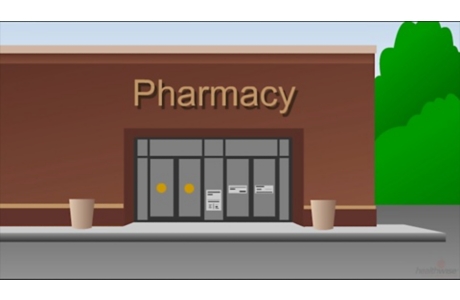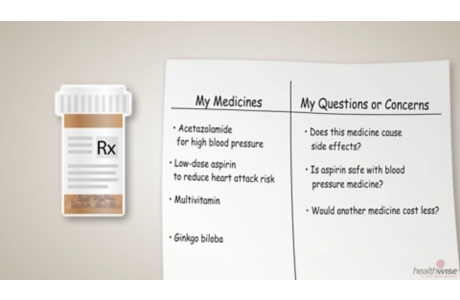Taking Medicines as Prescribed
Topic Overview
Medicine is one of the many tools your doctor has to treat a health problem. Taking medicine as your doctor suggests will improve your health and may prevent future problems. If you don’t take your medicines properly, you may be putting your health, and perhaps your life, at risk.
Taking your medicines as your doctor says may include:
- What time you take them, such as in the morning or evening, or at 8 a.m. or 6 p.m.
- How much you take, such as 2 tsp (10 mL) or 3 pills.
- How you take them, such as with water, with food, or on an empty stomach.
- How long you take them, such as for 2 months or until your doctor says to stop.
Medicine and Long-Term Health Problems
You may be taking medicine for a long-term (chronic) health problem. Some chronic diseases can be controlled, but they usually cannot be cured. You may need to take one or more medicines for the rest of your life.
Here are some examples of common chronic health problems and how medicines help:
- Medicines for type 2 diabetes can help your body make more insulin or decrease resistance to insulin. Some diabetes medicines slow how quickly your body absorbs carbohydrate. All of these medicines help you manage high blood sugar. Managing your blood sugar can lower your risk of eye, heart, blood vessel, nerve, and kidney disease.
- Medicine for high cholesterol helps lower your risk of heart attack and stroke.
- Medicines for chronic obstructive pulmonary disease (COPD) help you feel better and make it easier for you to breathe. You may be less likely to need to go to the hospital.
- Medicines for osteoarthritis help with pain and allow you to be more active. Being active can also reduce pain and make joints and muscles stronger. Being active can help slow how fast osteoarthritis gets worse and may help prevent falls.
Taking a lot of pills increases your chances of having problems. If you take more than one medicine that works the same way, you could get too high a dose. And sometimes medicines work against each other. So make sure you know how to stay safe when you take several medicines.
For some ideas about how you can remember to take your medicines, pay for them, and when to call your doctor, see Quick Tips: Taking Medicines Wisely.
Overcoming Barriers to Taking Your Medicines
People don’t take medicines properly for many reasons. If you’re having problems taking your medicines as prescribed, it may help to think about why you’re having trouble. When your reasons are clear, you can find ways to deal with the problems. This may make it easier to take your medicines as your doctor wants you to.
Here are some common concerns about taking medicines, along with some ideas for dealing with them.
Concerns
“Medicines cause side effects that bother me.”
“The medicine makes me feel worse.”
“I think the medicine is making my health problem worse.”
What you can do
- If side effects bother you, talk to your doctor or pharmacist. Your doctor may be able to prescribe another medicine or suggest ways to reduce side effects. For example, if an upset stomach is a problem, ask if taking the medicine with food will help.
- Ask your doctor or pharmacist about medicine interactions. One medicine you are taking may change what another medicine does. This can cause worse side effects or make a problem worse.
- Ask your doctor if there are medicines you should not take. This includes supplements and herbal products.
For more information, see the topic Dealing With Medicine Side Effects and Interactions.
Concerns
“Medicine costs too much.”
“I don’t have insurance.”
What you can do
- Talk to your doctor or pharmacist. Is there a lower-cost medicine you can take? Can you use a generic medicine? Does your health plan offer lower-priced options? He or she may have other ideas that could save you money, such as buying in bulk or splitting pills.
- Shop around. The cost of a medicine can vary from one drugstore to another. You can also look into mail order and using the Internet.
- Call social services or religious groups for possible help, or get in touch with Medicaid, a government program that may be able to help you with medicine and treatment.
- Some drug companies offer help. Search the Internet for the drug or company name and “patient assistance program.” If you’re not sure about your medicine’s name or who makes it, ask your doctor or pharmacist.
- Make sure you are taking medicines that are covered by your health plan, if possible.
- Make lifestyle changes to improve your health. Eating lots of fruits and vegetables and less fat and getting more exercise may help your health problem. This could mean that you need less medicine. Less medicine means lower costs.
- Don’t use less of your medicine, such as taking half a dose or using it every other day. It’s very important to take the medicine as your doctor tells you.
For more information, see the topic Reducing Medication Costs.
Concerns
“It’s hard to keep track of so many medicines.”
“I forget when and how to take all of these medicines.”
“Sometimes I just forget to take my medicines.”
What you can do
- Ask your doctor which medicines you are taking and why you are taking them, and then make a list. If you understand what you are taking and how it is helping you, it may be easier to stay on schedule. Complete a master list of medicines( What is a PDF document? ), and keep it up to date. At every visit with your doctor, review your master list of medicines.
- Plan a daily schedule of medicines. Be sure you understand how much of each medicine to take and when to take each one. Put your schedule somewhere where you will always see it and where it’s easy to find. Take it along when you travel. Write down your daily medicine schedule in a form that has spaces for time entries( What is a PDF document? ).
- Use a pillbox. Get a pillbox that holds a week’s worth of pills. This may be especially helpful if you are taking pills every other day.
- Remind yourself. Post notes near clocks or on the bathroom mirror to remind you to take your medicines. Use a wristwatch with an alarm, and set it when you need to take your medicine. Take the medicine when you do a daily task, such as brushing your teeth or making your coffee.
- Ask your doctor whether you can take a longer-acting medicine instead of a shorter-acting one. This means you’ll be able to take fewer pills. This may make it easier for you to remember to take your medicines.
- If you use several inhaler medicines, put a label on each one so that you know which one to use at the right time.
- Talk with your doctor about what you should do if you miss a dose of a medicine. Discuss what to do for each medicine—it may be different for each one.
For more information, see the topic Keeping Track of Medicines.
Concerns
” I keep getting interrupted before I can take my medicine.”
“My schedule keeps changing, so it’s hard to remember to take my medicine.”
What you can do
- Ask the person interrupting you to wait while you take your medicine.
- Keep your medicine in your hand. You will be more likely to take it later.
- Will the schedule change affect your medicine schedule? Be sure to make time to take your medicine.
- Place a reminder someplace where you will see it, such as in your car or on a house key.
Concern
“I run out of my medicine.”
What you can do
- Talk with your doctor or pharmacist about how long your medicine will last. Then mark on a calendar when you need to get a refill of your medicine.
- Ask your doctor to prescribe a large supply of medicine with many refills. For example, if you’re taking a medicine long-term, ask for a 3-month supply with a year’s worth of refills.
- Ask your pharmacist if there are ways the pharmacy can remind you to refill your medicines so you don’t run out.
Concerns
“I feel good, so I don’t take my medicine.”
“I don’t think my medicine is working.”
What you can do
- Remember that you feel good because you’re taking the medicine.
- Remember that some health conditions, such as high cholesterol and high blood pressure, don’t make you feel sick. But medicine can lower your risk of serious problems, such as a heart attack and stroke.
- Remember that some medicines do not help right away—they take time.
- Remember that your medicines can help you prevent complications that could happen because of your health problem.
- Talk to your doctor about your concerns.
Concerns
“I need to use an inhaler, but it’s too hard to use.”
“I have to give myself a shot, and it’s hard for me.”
“It’s hard for me to swallow pills.”
What you can do
- Ask your doctor or pharmacist to show you how to use your inhaler. Using a device called a spacer may make it easier.
- Ask your doctor about medicines that don’t require an inhaler.
- Ask your doctor, pharmacist, or diabetes educator for advice or tips on giving yourself shots.
- Try these tips for swallowing medicines.
Current as of: December 13, 2018
Author: Healthwise Staff
Medical Review:E. Gregory Thompson, MD – Internal Medicine & Adam Husney, MD – Family Medicine
This information does not replace the advice of a doctor. Healthwise, Incorporated, disclaims any warranty or liability for your use of this information. Your use of this information means that you agree to the Terms of Use. Learn how we develop our content.




